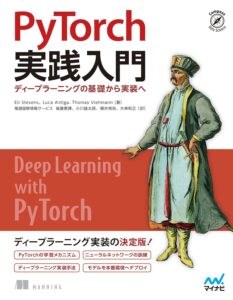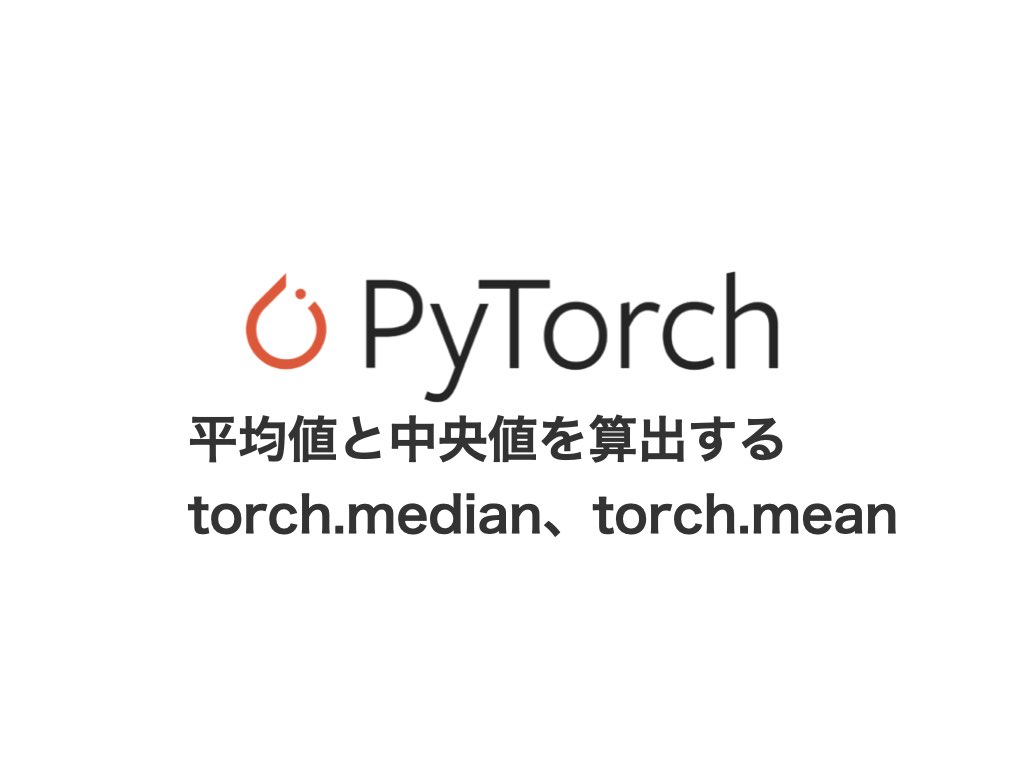PyTorchのTensor配列で平均値を求めるにはtorch.mean、torch.nanmean、中央値を求めるにはtorch.median、torch.nanmedianを使う。
- torch.mean – PyTorch v2.2 Docs
- torch.nanmean – PyTorch v2.2 Docs
- torch.median – PyTorch v2.2 Docs
- torch.nanmedian – PyTorch v2.2 Docs
平均値:torch.mean
torch.mean()の第一引数inputにTensor配列を渡すと、平均値が返ってくる。
import torch
a = torch.arange(12, dtype=torch.float32).reshape(3, 4)
print(a.shape)
print(a)
# torch.Size([3, 4])
# tensor([[ 0, 1, 2, 3],
# [ 4, 5, 6, 7],
# [ 8, 9, 10, 11]])
print(torch.mean(input=a))
# tensor(5.5000)引数dimに0を指定するて列ごとの平均値、dimに1を指定すると行ごとの平均値を算出できる。
print(torch.mean(input=a, dim=0))
# tensor([4., 5., 6., 7.])
print(torch.mean(input=a, dim=1))
# tensor([1.5000, 5.5000, 9.5000])nanがあるTensor配列をtorch.meanに渡すと、nanが返ってくる。
b = torch.tensor([[torch.nan, 1, 2], [1, 2, 3]])
print(b.shape)
print(b)
# torch.Size([2, 3])
# tensor([[nan, 1., 2.],
# [1., 2., 3.]])
print(torch.mean(input=b))
# tensor(nan)torch.nanmean
nanを除外して平均値を求めたい場合は、torch.nanmeanを使う。使い方は、torch.meanと同様である。
print(torch.nanmean(input=b))
# tensor(1.8000)
print(torch.nanmean(input=b, dim=0))
# tensor([1.0000, 1.5000, 2.5000])
print(torch.nanmean(input=b, dim=1))
# tensor([1.5000, 2.0000])中央値:torch.median
torch.median()の第一引数inputにTensor配列を渡すと、中央値が返ってくる。
print(torch.median(input=a))
# tensor(5.)引数dimに0を指定するて列ごとの中央値、dimに1を指定すると行ごとの中央値を算出できる。また中央値のインデックスが返ってくる。
values, indices = torch.median(input=a, dim=0)
print(values)
print(indices)
# tensor([4., 5., 6., 7.])
# tensor([1, 1, 1, 1])
values, indices = torch.median(input=a, dim=1)
print(values)
print(indices)
# tensor([1., 5., 9.])
# tensor([1, 1, 1])nanがあるTensor配列をtorch.medianに渡すと、nanが返ってくる。
print(torch.median(input=b))
# tensor(nan)torch.nanmedian
nanを除外して中央値を求めたい場合は、torch.nanmedianを使う。使い方は、torch.medianと同様である。
print(torch.nanmedian(input=b))
# tensor(2.)
values, indices = torch.nanmedian(input=b, dim=0)
print(values)
print(indices)
# tensor([1., 1., 2.])
# tensor([1, 0, 0])
values, indices = torch.nanmedian(input=b, dim=1)
print(values)
print(indices)
# tensor([1, 0, 0])
# tensor([1, 1])関連記事、参考資料
PyTorch公式ページでも紹介されていた本で、「Tensorの仕組み」から「ディープラーニングの実践プロジェクト:肺がんの早期発見」までステップバイステップで説明しているため、PyTorchの中身をよく理解できるのでオススメです。


コメント